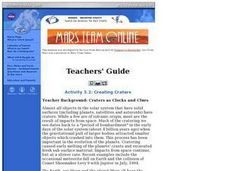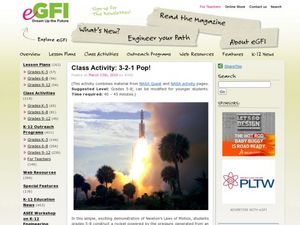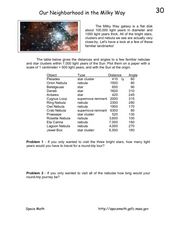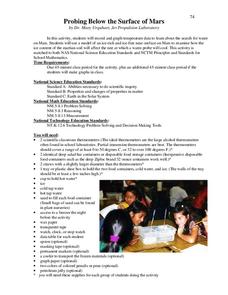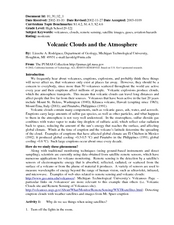Curated OER
MAPPING THE TOPOGRAPHY OF UNKNOWN SURFACES
Students describe in words and graphic displays the elevation or depression profile of sections of Mars' Olympus Mons and/or Valles Marineris. They explain how orbiting spacecraft build up global maps one data slice at a time.
Curated OER
Creating Craters
Students explore parts of an impact crater and compare and contrast craters found in Earth, the Moon, and Mars. Crater formation is modelled and the relationship of mass, velocity, and size of the projectile to the crater formation is...
Curated OER
Lift and Launch Angle
Students engage in a hands-on experiment to determine how launch angles affect airflow around the wing of an aircraft. They view a series of photographs and read information describing the Wright Brothers' experiences. They complete a...
Curated OER
3-2-1 Pop!
Students explore rocketry and demonstrate how rocket liftoff is an application of Newton's Laws of Motion. They construct a rocket powered by the pressure generated from an effervescing antacid tablet reacting with water.
Curated OER
Altitude Tracking
Students construct simple altitude tracking devices for determining the altitude a rocket reaches in its flight. They estimate the altitude a rocket achieves during flight.
Curated OER
Scientist Tracking Network
Students correlate surface radiation with mean surface temperature of several geographic regions. They observe how these parameters change with latitude and construct an understanding of the relationship of solar radiation to seasonal...
Curated OER
Carbon Monoxide and Population Density
Tenth graders investigate the carbon monoxide level at a fixed latitude to determine if there is a relationship to population density. They download data sets and generate a graph, and find locations using the Earth's coordinate system....
Curated OER
Angular Size and Similar Triangles
In this angular size and similar triangles activity, students use the properties of similar triangles and the ratios of sides to solve for unknowns in given diagrams.
Curated OER
Distances Between Stars
In this distance between stars activity, students use the 3-dimensional distance formula and Cartesian coordinates to find the distances of 10 given stars from the sun. They also determine which constellation each star belongs to and the...
Curated OER
The Changing Atmosphere of Pluto
In this atmosphere of Pluto worksheet, students use an equation for the orbit of Pluto to determine the semi-major axis, the semi-minor axis, the ellipticity of the orbit, the aphelion and the perihelion. They also determine the...
Curated OER
Galaxies to Scale
In this scales and galaxies worksheet, students solve 7 problems including finding the size of galaxies in comparison to other galaxies and drawing scale models of the given galaxies to show their relative sizes and shapes.
Curated OER
Magnetopause and Solar Storms
For this magnetopause worksheet, students use a given equation to find the distance from the Earth where the solar wind pressure and the Earth's magnetic field pressure are equal. Students are given 5 different solar storms and use the...
Curated OER
Spectral Classification of Stars
In this spectral composition of stars worksheet, students use data collected by a spectroscope to compare the stellar spectra to a standard for 5 stars. Students compare the spectral lines to the temperatures of the stars.
Curated OER
Introduction to Radiation Shielding
In this radiation shielding activity, learners use a graph of the dosage of radiation versus the thickness of aluminum shielding using data from the MIR spacecraft and ISO satellite to solve 3 problems. They determine how thick the walls...
Curated OER
Magnetic Forces and Kinetic Energy
In this magnetic forces and kinetic energy worksheet, students use the formula that relates the speed of an electron in a plasma cloud to its energy to find the speed of 6 different plasma cloud electrons. They answer 5 questions that...
Curated OER
A Problem in Satellite Synchrony
In this satellite synchrony worksheet, students use a spreadsheet or Least Common Multiples to solve 4 problems related to the satellite orbits, orbital periods and their synchronicity. Students determine when the satellites launched in...
Curated OER
Falling into a Black Hole
In this black hole worksheet, students solve 3 problems given the equation used to determine the speed of a falling body using its mass, the constant of gravitation and the distance it will travel.
Curated OER
Measuring Speed in the Universe
In this measuring speed in the universe instructional activity, students use photographs of 3 astronomical phenomena including supernova explosions, coronal mass ejections and solar flare shock waves to find how fast they move. The...
Curated OER
LRO Explores Lunar Surface Cratering
In this lunar surface instructional activity, students use an image taken by the LRO satellite to investigate the size of craters on the moon's surface, to determine the crater density and to find the average distance between the craters.
Curated OER
LRO's First Image of Mare Nubium
For this scale image worksheet, students use an image taken by the LRO satellite of Mare Nubium to determine the scale of the image, the diameter of the smallest crater and a comparison scale drawing of a house.
Curated OER
How Fast Does the Sun Spin?
In this rotation of celestial bodies worksheet, learners determine the speed of the sun's rotation and they determine the number of days it takes the sun to rotate once at the equator. They identify the geometric factor that causes...
Curated OER
Our Neighborhood in the Milky Way
In this Milky Way galaxy worksheet, learners are given a table of distances and angles of nebulae and star clusters from the sun. Students plot each one on a piece of paper and solve 2 problems using the data.
Curated OER
Probing Below the Surface of Mars
Learners simulate the search for water in Mars using simple apparatus. For this space science lesson, students explain how soil temperature affects the cooling of probes. They graph the data collected from the simulation.
Curated OER
Volcanic Clouds and the Atmosphere
High schoolers examine how scientists monitor volcanoes. In this volcano lesson students complete several activities including why we see things when using satellites.


